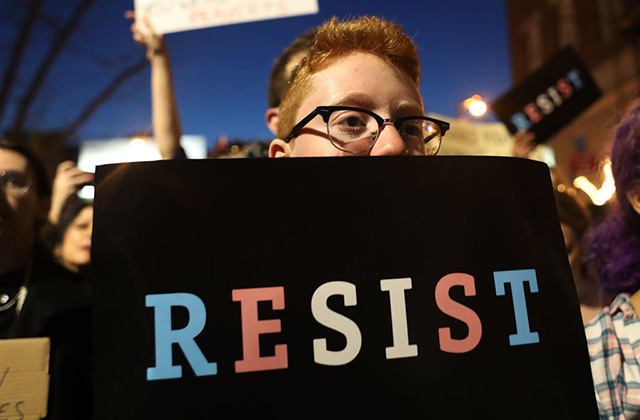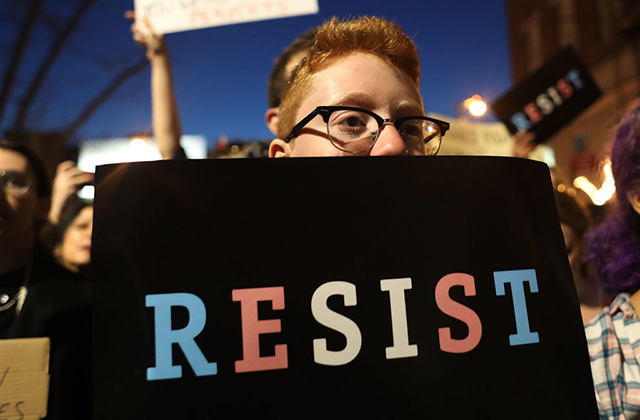
 Hundreds protest a Trump administration announcement this week that rescinds an Obama-era order allowing transgender students to use school bathrooms matching their gender identities, at the Stonewall Inn on February 23, 2017, in New York City. (Photo: Spencer Platt / Getty Images)
Hundreds protest a Trump administration announcement this week that rescinds an Obama-era order allowing transgender students to use school bathrooms matching their gender identities, at the Stonewall Inn on February 23, 2017, in New York City. (Photo: Spencer Platt / Getty Images)
The Department of Justice’s decision to take a formal stand against LGBTQ rights this week was bad news for reasons beyond the obvious.
By filing a brief this Wednesday in support of the people who fired a skydiving instructor for being gay, the Justice Department went out of its way to attack LGBTQ people, making a point of claiming that federal law says employers may discriminate against people for their sexual orientation.
The government was not suing or getting sued; it could have chosen not to submit anything regarding the case. The easiest thing for DOJ to do would have been to stay out of it. But Jeff Sessions, or someone else with enough clout to call the shots, decided that attacking LGBTQ people was a high enough priority to get involved.
It’s true that Congress has yet to pass an employment discrimination law that explicitly names sexual orientation or gender identity. And it should, just to avoid these fights in courts.
But it’s not true that Congress hasn’t passed a law that protects people from anti-LGBTQ discrimination. When Congress passed Title VII, it prohibited discrimination “because of sex.” The Supreme Court has quite reasonably ruled that “sex” doesn’t just refer to body parts — it refers to gender and gender stereotypes. Anything else would gut the law, keeping even heterosexual cisgender women from receiving redress for overt employment discrimination they experience.
We have a story floating around in dominant culture. This story tells us that as soon as we can discern genitals in an image of a fetus or on the body of a newborn, we know a host of other things about the person that fetus or newborn may become. We imagine we know that someone born with a penis will have other physical characteristics typically considered male, behave in ways typically considered masculine, understand themselves as a boy and then a man, and feel romantic and sexual attraction to women exclusively. These expectations and stereotypes get heaped on us as soon as we’re born, or even before, because of the sex we are perceived to be. People born with a penis who do meet all those expectations — or at least almost all of them, almost all the time — get rewarded. Those who don’t, get punished. Perhaps, for example, by getting fired for loving other men while being a man.
The Department of Justice just said it’s OK to fire gay men so long as lesbians get fired too. This is wrong. When employers discriminate against people for not matching gender stereotypes, they discriminate because of sex. That’s against the law — even if they discriminate against both men and women who don’t fit gender stereotypes.
But the Department of Justice brief is bad news for more reasons than that.
The brief went further than attacking cis gay men. It supported a definition of sex based on “biology” and separate dress codes for men and women. (Dress codes weren’t an issue in the case.) Three times, it defended the “obvious” legitimacy and importance of segregating restrooms by sex. (Restrooms weren’t an issue in the case.) Although the brief didn’t name trans people, it still telegraphed antipathy toward us.
Moreover, the brief was not the only bad news this week. Trump’s tweets saying that trans people would no longer be allowed in the military, as well as his announced nomination of notoriously anti-LGBTQ and anti-woman governor Sam Brownback as ambassador-at-large for religious freedom, happened on the same day. Meanwhile, some Republicans continued to push for health care repeal (although the repeal was again defeated by a narrow margin). And anti-trans bills and ballot initiatives inched their way forward. Taken together, this is very bad news.
To be clear, I’m not saying that formal protection under anti-discrimination law, a more inclusive military, or enlightened ambassadors are the path to trans, LGBQ and women’s liberation. Even as we fight for clear anti-discrimination laws, we must remember that anti-discrimination law has never ended discrimination against any group. As we refuse to let anyone throw away the lives or deny the humanity of trans service members and veterans, we must also refuse to let anyone throw away the lives or deny the humanity of the many trans and cis people harmed by US military action. But what I see in these developments is both a disturbing pattern and a tightening knot.
The pattern is that Trump and his administration use LGBTQ people and women in whatever ways he thinks will advance his agenda to harm immigrants and people of color. In his executive order announcing the Muslim ban, he claimed to be protecting women and LGBTQ people from sexist and anti-gay violence perpetrated by Muslim immigrants. Now, according to Politico, he may have announced a trans military ban to increase his chances at funding an expanded border wall.
The tightening knot already entangles trans people, shutting down option after option for our survival. If private businesses refuse to employ LGBTQ people and nondiscrimination laws don’t protect us, what can we do? Maybe join the military, but then what if the military kicks us out? Maybe go to school, but what if anti-trans rules about bathrooms keep us out? Maybe apply for benefits like Medicaid — but what if they cease to exist? Maybe depend on friends and family, but what if they are deported away from us? Conceivably flee the country hoping for better elsewhere, but what if the US further exports its hatred through diplomacy, eliminating safer havens? What’s left?
I fear the answer is prison. For far too many trans people, it already is: nearly one in six trans people, and nearly half of Black trans people, have been incarcerated at some point in their lives.
And that brings to mind another legal development from this week — one that won’t make the news. A trans person in prison got beaten up, badly and repeatedly, because she was perceived as gay. She asked a staff member for help repeatedly. She didn’t get it. She wrote grievances, appeals and complaint letters to anyone she thought might help. Then she sued, and she lost, because the government claimed she didn’t send the right forms on the right type of paper to the right people in the right order. That’s usually a winning argument under a 1996 law called the Prison Litigation Reform Act, and it won here.
Trump called trans people too “disruptive” to be in the military. Prison officials sometimes call trans people too “disruptive” to live among other people, and so they stick trans folks in solitary confinement.
If trans people can’t get help when fired from jobs or attacked in prison, if trans people are too disruptive for both the military and prison populations, what’s left?
We are. All of us.
I don’t claim to have all the answers or the best answers. But it seems to me that now, more than ever, we rise and fall together. If we do not defeat the border wall and the Muslim ban, if we do not dismantle prisons, racism and xenophobia, we cannot achieve gender and sexual justice.
Our activism and organizing should focus on protecting the lives and supporting the leadership of Latinx, immigrant, indigenous, people of color, and Muslim LGBTQ people and women. We should be doing the everyday work to fight sexual violence. We should be doing everything we can to defend Medicaid from future attacks, to improve and expand benefits — or at least supporting the disabled and low-income people of color leaders on the front lines of this work. We should be getting involved to fight anti-trans bills and ballot initiatives — or at least supporting local trans and allied organizations that are fighting these battles. We should be deepening practices of interdependence and mutual aid, helping each other whenever and however we need it. We should be building communities across prison walls.
Together, it is possible to break the pattern and cut the knot.
3 Days Left: All gifts to Truthout now matched!
From now until the end of the year, all donations to Truthout will be matched dollar for dollar up to $38,000! Thanks to a generous supporter, your one-time gift today will be matched immediately. As well, your monthly donation will be matched for the whole first year, doubling your impact.
We have just 3 days left to raise $38,000 and receive the full match.
This matching gift comes at a critical time. As Trump attempts to silence dissenting voices and oppositional nonprofits, reader support is our best defense against the right-wing agenda.
Help Truthout confront Trump’s fascism in 2026, and have your donation matched now!